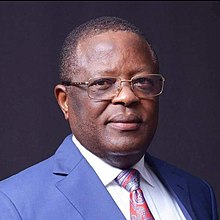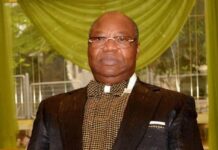
Who leads the 9th National Assembly is already a contentious issue.
Although the National Assembly is self-regulatory, the controversy was sparked off by the endorsement of personalities for the positions of the Senate President and Speaker House of Representatives by the leadership of All Progressives Congress (APC).
President Muhammadu Buhari, APC National Chairman, Adams Oshiomhole and APC National Leader, Asiwaju Bola Tinubu, settled for Sen. Ahmad Lawan and Rep. Femi Gbajabiamila for Senate President and Speaker, House of Representatives, respectively.
Buhari at a dinner for Senators-elect of the APC, impressed it upon them that Lawan, the current Senate Leader, would be the party’s choice for the Senate Presidency.
“Buhari made it known that Lawan is his choice and begged the Senators-elect to support him.
“He spoke about how the present leadership of the National Assembly slowed down his government, stressing that the last four years have not been good for his government because of the hostilities from the leadership of the National Assembly.
“The president said that he spent 12 years aspiring for the presidency and that the first four years was almost ruined and frustrated by the leadership of the National Assembly.
“He said that though there would be friction between the executive and legislature, he wants a situation where if there is a misunderstanding, it will be settled like a family,” a Senator-elect who attended the meeting said in an interview.
Oshiomhole, who also spoke reaffirmed the president’s position.
According to him, the essence of the meeting is to plan on how to manage the leadership of the National Assembly to ensure that there will be no business with the opposition this time around.
He declared that the leadership of the 9th National Assembly will comprise only APC members and won’t be “adulterated’’ by the opposition.
Oshiomhole noted that the ruling party had already about 65 Senators-elect out of 109 and 223 House of Representatives members out of the 360 and could take decision at any time without recourse to other political parties.
In the same vein, Asiwaju Bola Tinubu, explained that the party leadership preferred Lawan to other contestants because of his consistency and intellectual capacity.
However, the position of the national leadership of the APC appeared not to be acceptable to all the members.
Already, leaders from the North-Central zone had rejected zoning of the speakership to the South-West, while Sen. Ali Ndume, from the North-East like Sen. Lawan said he would contest the Senate Presidency.
Ndume demonstrated his seriousness to contest the position as he recently released his agenda.
Ndume, who has been in the National Assembly since 2003, promised to improve upon the performance of the 8th Senate.
He said that he would make the Office of the Senate President less attractive by reducing the unnecessary privileges attached to it.
Ndume remained unyielding, after a recent visit to Vice-President Yemi Osinbajo at Presidential Villa, Abuja, which may not be unconnected with the Senate Presidency issue.
He told State House Correspondents in a brief interview, “Me step down? I am still consulting.”
APC stakeholders from the North-Central zone recently lodged their protest at the National Secretariat of the APC in Abuja.
They demanded zoning of the House of Representatives speaker to the zone.
The group, under the auspices of North-Central APC Ambassadors, in a letter dated April 1, addressed to the National Chairman of the party, Adams Oshiomhole, insisted that the zone should be given the opportunity to produce the speaker of the House of Representatives.
The zone, they said, should be rewarded for giving Buhari 2.4 million votes in the presidential poll.
The letter was jointly signed by coordinators from Kwara, Plateau, Niger, Nasarawa, Kogi and FCT.
However, Mr Yakubu Dogara, the Speaker of the House of Representatives, did not condemn endorsement, but advised political parties to resist the urge to impose candidates for leadership positions in the two chambers of the National Assembly.
Dogara spoke at the orientation ceremony organised for 9th National Assembly members-elect.
According to him, history has shown that sponsoring candidates by political parties for NASS leadership positions is always a futile effort.
He advised political parties with such agenda to ensure that they carried all their members along so that they would have a sense of belonging and defend their leaders, when the need arose.
He said: “I am not here to dictate to the parties, parties have their manifesto, parties know how they conduct their businesses.
“But one thing I have said, if you followed the business during this induction exercise, it is always better to allow the leadership to emerge from the people.
“But where leadership has been forced upon the people, in the history of the NASS, we are all part of this history in Nigeria, it has never endured.
“Whoever a party is sponsoring or supporting, they should make sure that they have the backing of the legislators so that they accept it, own the process and own the leadership.
“That way, they will always come out to defend it, but in a situation where it is forced, literarily driven down their throats, in most cases, even in the Senate, it doesn’t augur well.”
The speaker said that an aspiring leader must possess the ability to go about achieving his ambition without rancour.
He further said that such an aspirant must also have the ability to steer the affairs of the legislature to surpass the achievements made by the 8th Assembly.
“Some of us, who have been on the field know how that is done and our advice is that we stay calm,” Dogara said.
He said that even though many people were aspiring for leadership positions in the NASS, it would be imperative to have a rancour-free election.
He said that the important thing was for the emergence of those that would “be able to sustain what we have done in the 8th Assembly and even surpass it.
“We do not want any leadership that will take us back, we have made a lot of mileage.
“And we hope we are able to get the kind of leadership that will build on the achievements of this assembly, which is unparalleled in our legislative history.
“So, I will advise members to look at members that have thrown themselves into the race to see who it is that will aggregate their aspirations better and be able to surpass the records of this current Assembly,” the speaker said.
Meanwhile, a group that calls itself All Progressives Youth Solidarity Network, has appealed to the leadership of the APC to withdraw support for incumbent Senate leader, Ahmed Lawan, as their anointed choice for the presidency of the 9th Assembly.
Addressing newsmen recently in Abuja, Coordinator of the group, Shuaibu Usman, said all the contenders for the exalted office should be rejected having played prominent roles in the current Senate leadership led by Senator Bukola Saraki.
“On this note, we call on President Muhammadu Buhari, the National Leader, Ahmed Bola Tinubu, National Chairman, Comrade Adams Oshiomhole and party faithful to immediately come to the aid of the APC members and shop for a candidate without PDP connection ahead of the June inauguration of the National Assembly.’’
Contemporary observers say it is obvious that the way things are going, what played out in June 1999, when Chief Evan Enwerem was elected Senate President may repeat itself.
Enwerem was the preferred candidate of then President Olusegun Obasanjo and the party leadership. Dr Chuba Okadigbo, from the South-East where the position was zoned defied the endorsement.
He contested against Enwerem, and on the floor of the Senate on June 17, 1999, Enwerem defeated Okadigbo.
The Okadigbo group did not give Enwerem, whom they perceived as a stooge to the executive a breathing space, and on Nov. 18, 1999 he was impeached and Okadigbo elected Senate President.
The executive and other forces ganged up against Okadigbo, and he was subsequently impeached in August, 2000 and Anyim Pius Anyim elected as Senate President.
How the leadership issue in the 9th National Assembly will end up is still uncertain, but the advice of Dogara and his postulation should not be ignored.
“But where leadership has been forced upon the people; in the history of the NASS, we are all part of this history in Nigeria, it has never endured.’’
All the gladiators in the leadership question in the 9th National Assembly should learn from the lessons of history, and make a difference from the age long adage that people do not learn from the lessons of history. (NANFeatures)
Culled from: Source



